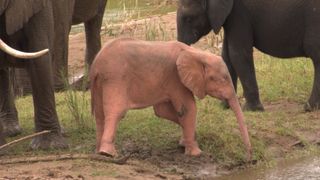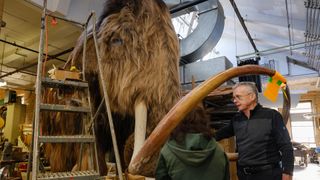Elephants
Latest about Elephants

Elephants say 'hello' to friends by flapping their ears and making little rumbly noises
By Meg Duff published
Elephants use ear flaps, rumbles, trunk reaches and other forms of communication to greet peers, new research suggests.

'Most of Gorongosa's large animals had died': How an African paradise for nature recovered from the ravages of war
By Alexander McNamara published
"Where once there had been more than two thousand elephants, now there were fewer than two hundred."

'They are very well aware of their agency': Elephant calf burial ritual discovered in India
By Hannah Osborne published
Elephant burial rituals have been discovered in India, with herd members placing calves upside down in irrigation pits then covering the bodies with soil.

Watch a rare pink albino elephant baby playing by a waterhole in adorable footage
By Elise Poore published
The adorable 1-year-old male calf was filmed enjoying playtime in Kruger National Park in South Africa.

Scientists may have finally figured out how elephants got their incredible trunks
By Jacklin Kwan published
Elephants appear to have evolved their long, grasping trunks as a result of climate change pressures on their ancestors millions of years ago.

'It's really quite remarkable': An interview with elephant expert Ross MacPhee about the giant pachyderms
By Laura Geggel published
In this interview, elephant expert Ross MacPhee explains how the giant animals' tusks record every week of their lives and why their noses are so remarkable.

Dwarf elephants and shedding mammoths shine at NYC's 'Secret World of Elephants'
By Laura Geggel published
A new show on "The Secret World of Elephants" at the American Museum of Natural History in New York City dishes on the evolution and remarkable lives of these huge (and sometimes dwarf) pachyderms.

Elephants give each other names — the 1st non-human animals to do so, study claims
By Richard Pallardy published
Elephants in Kenya's Amboseli National Park appear to call to each other with individual names using low, complex "rumbles," a study has found.
Sign up for the Live Science daily newsletter now
Get the world’s most fascinating discoveries delivered straight to your inbox.


